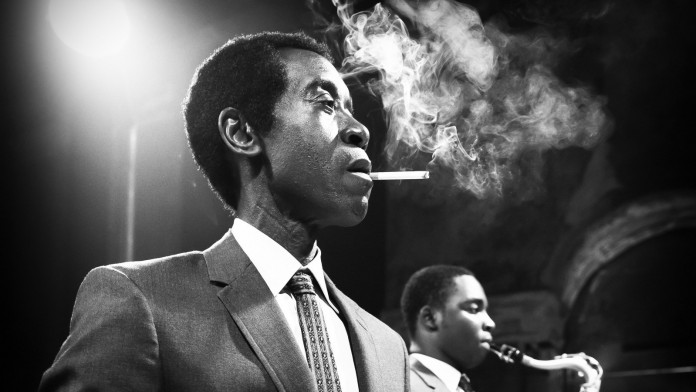“If you’re gonna tell a story, come with some attitude”. This is the line of dialogue that opens this extraordinary biopic of the distinguished artist Miles Davis, and it’s a notion wholeheartedly adhered to by the lead star and director Don Cheadle, marking his feature film debut with a gloriously inventive, ingenious affair that thrives on the haphazard, volatile spirit and outlook of this renowned musician.
Somewhere in this illustrious career came a barren spell for Davis, and it’s here where our story is predominantly set. We focus in on the destructive nature of the artist, and not the glory. By no means a cradle to the grave approach, our narrative takes place mainly across one day, as Rolling Stone journalist Dave Brill (Ewan McGregor) approaches Davis for a feature about his forthcoming ‘comeback’.
Supposedly put up to the article by the musician’s record label Columbia, they’re also keen to get their hands on a session tape Davis is hiding at his house, and so set a budding trumpet player (Keith Stanfield) and his manager, Harper Hamilton (Michael Stuhlbarg) on the case, to steal a record they believe is rightfully theirs, and by any means necessary. During the chaos that ensues, Davis is reminded of his tempestuous marriage to the love of his life, Frances Taylor (Emayatzy Corinealdi).
It’s interesting, again, to peer into the life of somebody so significant, through the curious eyes of a journalist. Similarly to the likes of The Program, Life or even Philomena, it places the viewer into the film in an accomplished manner, as we embody the role of the outsider, the character who is being let in, studying the subject and learning about them as they go along, just as we are naturally doing.
Cheadle turns in a truly magnetic display, and one unfairly disregarded during the award’s season chat. It’s an honest portrayal of the subject too, not just showing his flaws but the entire film is based around his imperfections and for such a fiery character, his fragility too. We don’t eulogise over Davis, nor do we romanticise over his past, we see him for who he was – and the film is all the better for it.
There’s something endearingly unpredictable about this piece too, as a film that isn’t too far removed from that of a jazz composition (or social music, as Davis would prefer for it to be called). Just like a good record, this feels spontaneous, as though improvised, without any palpable structure to it. Not to mention the pacing of the production, in how we build up to a crescendo in the latter stages which subsequently explodes, all while Davis’ music plays in the background. Here is a film that is gloriously chaotic, much like the man himself.








